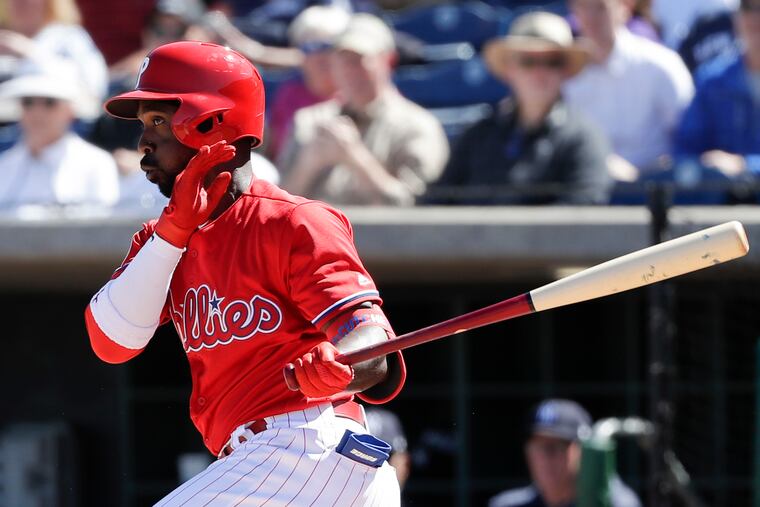Phillies thoughts: Andrew McCutchen at leadoff, a Mike Trout assumption, and Dallas Keuchel for the right price | David Murphy
Does Mike Trout really want to play in Philadelphia?

Three thoughts about the Phillies after a week in Clearwater:
1. I think I like Andrew McCutchen leading off. At least, until I think I like somebody else.
Full disclaimer: I think there is a huge disparity between the actual importance of lineup construction and the amount of time that we spend talking about it. But there’s also a huge disparity between the actual importance of baseball in general and the amount of time we spend talking about it. So let’s talk about it.
Manager Gabe Kapler has no shortage of options for his leadoff spot. Cesar Hernandez, Jean Segura — even Bryce Harper has spent some time at the top of the order. But I like McCutchen there for one simple reason: He’s been really good there. Or, at least, he was really good there last season, when he posted a .414 on-base percentage and 10 home runs in 222 plate appearances. Before then, McCutchen had not taken a single at-bat at the top of the order since 2011.
Now, I know I said that batting order construction does not matter as much as we’d like to believe. But I was talking holistically. From an individual standpoint, I think certain guys perform better in certain spots in the order, and I think there is some evidence to suggest that McCutchen might be a more productive hitter at this stage of his career in a table-setting role rather than a table-clearing one.
After the Giants moved him into the leadoff spot in late July last season, he posted a .391 on-base percentage, drawing 21 walks in 128 plate appearances after posting a .348 OBP with 52 walks in 440 plate appearances as a two- and three-hole hitter.
» READ MORE: Bryce Harper shows why he could be so dangerous in South Philly
In his time with the Yankees, which he spent at the top of the order, his walk rate was 19.3 percent, up from a career average of 12 percent. He’s always been a hitter who sees a lot of pitches, but in the leadoff spot for the Yankees, he saw 4.40 per plate appearance, compared with a career average of 4.04.
The counterargument is that Cesar Hernandez posted OBPs of .405 and .371 in nearly 900 plate appearances in the leadoff spot in 2016 and 2017, and that McCutchen’s edge in power makes him the better choice for a spot at No. 5 or No. 6. It’s a fair argument. But, again, we’ve already spent more time on this topic than it probably deserves.
2. I think Mike Trout actually has to want to play in Philadelphia for any of this to matter.
I’m not suggesting that he doesn’t. But I’m also not sure that everybody’s logic is entirely sound in concluding that he definitely wants to play baseball here just because he happens to like rooting for the Eagles and the Sixers.
In fact, there’s an argument to be made that playing here is the last thing that he should want if he really enjoys being a fan. One might even conclude that the fact that he enjoys the whole Jimmy Everyfan lifestyle is an indication that he might also enjoy the relative anonymity in which he plays in Anaheim, where the biggest stars all wear foam rodent costumes and speak in voices that sound as if they just hit a nitrous balloon in the Jetro lot (so you wanna get Goofy, eh?).
As one of my esteemed colleagues noted in a lunch-table discussion about this topic, we all remember Rob Manfred’s lament about Trout’s reluctance to market himself, which the MLB commissioner made at the All-Star Game last summer.
“You cannot market a player passively. You can't market anything passively,” he said. “You need people to engage with those to whom you are trying to market in order to have effective marketing. We are very interested in having our players more engaged and having higher-profile players and helping our players develop their individual brand. But that involves the player being actively engaged.”
Trout later responded with his best Popeye impression. And that’s something to keep in mind: He yiz what he yiz, and I’m not sure that’s the kind of person who would be comfortable playing in the kind of spotlight he’d have to endure in Philadelphia. There ain’t no “not being engaged” if you are walking through Rittenhouse Square as Mike Trout, Phillies superstar.
3. I think I’d think about paying Dallas Keuchel $20 million per season ...
... for one season. An important disclaimer is that this is not my money that I’m talking about. So it’s very easy for me to say this. It also isn’t Matt Klentak’s money. So it is also easy for him to say it.
The pertinent question is two-fold: (a) What does John Middleton think about the marginal benefit of adding a workmanlike but hardly overpowering pitcher at that sort of salary? (b) Might it take even more to get Keuchel on a one-year deal? At the moment, the Phillies payroll looks to be in the $180 million to $185 million range, at least for the purposes of luxury tax accounting (average annual value of guaranteed contracts plus a charge for player benefits plus whatever they spend on minimum-salary players). Which means they can definitely afford Keuchel, who is coming off a season in which he logged 204⅔ innings and a 3.74 ERA in 34 starts.
Thing is, Keuchel’s strikeout rate dropped last year, and he will be 31 years old, and he averaged under 160 innings in 2016 and 2017. I’d argue that, given the uncertainty behind Aaron Nola, adding another arm would be good insurance for a team that has already invested so much in winning now. But, again, it isn’t my money.